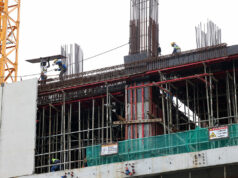Bond markets to remain on fire as global coronavirus crisis intensifies
By Beatrice M. Laforga, Reporter
INVESTORS will probably continue buying bonds for the rest of the year as the market remains awash with cash, the yield of 10-year bonds is at a 13-year low and players return to safety amid uncertainty about how deep and long a coronavirus-induced recession might be.
“Record low local interest rates especially for long-term tenors could reduce borrowing costs for the government, companies and consumers,” Michael L. Ricafort, chief economist at Rizal Commercial Banking Corp. (RCBC) said in an e-mail.
“But this could prompt a search for higher returns from riskier asset classes,” he said, adding that investors might shift their focus to longer-term bonds to maximize yields.
Policy makers have launched unprecedented fiscal and monetary support globally to shield their economies from various lockdown levels and the resulting liquidity challenges.
Central banks around the world dusted off nearly every available tool — from policy rates to reserve ratio cuts — to keep markets liquid and support economic growth.
The US Federal Reserve cut rates to zero, resumed quantitative easing and launched various facilities in pursuit of its dual mandate to promote maximum employment and stable prices.
Other central banks including the Bangko Sentral ng Pilipinas (BSP) have taken similar actions to support credit flow and keep markets functioning.
BSP’s Monetary Board has cut benchmark interest rates by 175 basis points to a record 2.25%, 2.75% and 1.75% for the overnight reverse repurchase, lending and deposit facilities, respectively.
Bonds have become the “flavor of the year” for investors seeking safety as the Philippine economy braces for its first recession in nearly two decades.
“Job prospects are bleak and the overall outlook is downbeat, so investors will naturally have a heightened preference for cash and investments that can provide a more sure-footed return — fixed income assets such as bonds,” Nicholas Antonio T. Mapa , a senior economist at ING Bank N.V. Manila Branch, said in an e-mailed reply to questions.
The economy shrank by 0.2% in the first quarter and the contraction is widely expected to have widened further last quarter as the impact of the lockdown came into full swing.
President Rodrigo R. Duterte locked down the entire Luzon island in mid-March, suspending work, classes and public transportation to contain a coronavirus pandemic that has sickened almost 70,000 and killed about 1,800 people in the Philippines. People should stay home except to buy food and other basic goods, he said.
He extended the lockdown for the island twice and thrice for the capital region. The lockdown in Metro Manila has since been eased, with many businesses allowed to reopen with minimal workforce. Mass gatherings remained banned.
The Treasury bureau has issued P1.153 trillion of government securities in the five months through May — P234.02 billion in Treasury bills, P307.86 billion in T-bonds, P311 billion in retail T-bonds and P300 billion that BSP had bought through a repurchase agreement.
The bureau also launched its second retail T-bonds for the year on July 16, selling five-year debt at a coupon rate of 2.625%, with tenders surging to P278.572 billion on the first day of sale.
STRONG DEMAND
“Retail Treasury bonds are an attractive investment proposition for smaller investors to enjoy relatively much higher interest income for a minimum investment compared with other deposit products,” RCBC’s Mr. Ricafort said.
The central bank has also announced a plan to issue central bank securities by the third quarter, with a preference for short-term tenors and small volume offers, adding to risk-free assets that investors can buy.
There would be “very strong demand” for both government and corporate bonds as the market remained very liquid,” said Carlyn Therese X. Dulay, first vice-president and head of institutional sales at Security Bank Corp.
“We can expect more bond issuances from both the government and the corporate side as well since yields are now very attractive to issuers,” she said in an e-mail.
Economists at First Metro Investment Corp. (FMIC) and University of Asia and the Pacific (UA&P) traced the strong liquidity to the central bank’s aggressive move to slash key rates and the reserve requirement for banks to cushion the effects of the COVID-19 pandemic.
“There may be more volatility in the longer end of the curve as the market seems unsure of the domestic borrowing intentions of the National Government,” according to their June issue of The Market Call.
There were 16 new listings of corporate bonds in January to June worth P175.5 billion, according to the Philippine Dealing & Exchange Corp. (PDEx). The first company to list its bonds on PDEx this semester was BDO Unibank, Inc., selling P36 billion worth of 1.75-year fixed-rate bonds on July 3.
BDO’s issuance was the 17th listing for the year, bringing the year-to-date total of new listings to P211.5 billion. So far, tradeable corporate debt has hit P1.45 trillion issued by 56 companies.
Strong liquidity and the low-interest rate environment could push returns of these safe-haven, fixed-income assets lower.
Companies would probably sell more bonds for the rest of the year to take advantage of low rates, Philippine National Bank (PNB) Head of Research Alvin Joseph A. Arogo said.
‘LEAP OF FAITH’
“The low interest rate environment will be an incentive for more companies to issue corporate bonds, allowing them to lower their average debt cost,” he said in an e-mail.
But FMIC and UA&P said there would be “less activity for new corporate bond issuances, except for refinancing maturing debt due to banks’ risk aversion and large firms’ cutback on capital expenditures in 2020.”
Mr. Mapa said the funds that the government and companies would raise from their bond issuances were likely to be used to make up for forgone income, pay off existing debt and beef up short-term working capital.
“Some companies may look to invest in a new COVID-19 strategy as pre-pandemic plans were shelved,” he said.
Rates of fixed-income securities in the secondary market have fallen since April, as investors’ flight to safety prevailed during the lockdown.
Bond yields have dropped by an average 34.5 basis points (bps) month on month across-the-board from end-May to end-June, according to the Philippine Dealing System, citing Bloomberg data.
The decrease was more apparent when compared with levels in mid-March, when the yields shot up as uncertainties during the start of the lockdown spooked investors.
Rates plummeted by an average 167.1 bps from March 16 — when Luzon first experienced one of the world’s longest lockdowns — to June 30.
“Uncertainty and anxiety will continue to dominate” as strict lockdowns across the country are slowly eased, Mr. Mapa said. Economic recovery will depend on restoring confidence and boosting the capacity of the nation’s public healthcare system, he added.
Rates would “remain near historic lows” because the Philippine central bank “has so much room to keep an accommodative posture to help restart the economy,” said Jonathan L. Ravelas, chief market strategist at BDO Unibank, Inc.
Improved business and consumer sentiment “should help businesses to take a leap of faith to borrow and slowly restart, while additional stimulus should boost the economy as well,” he added.



